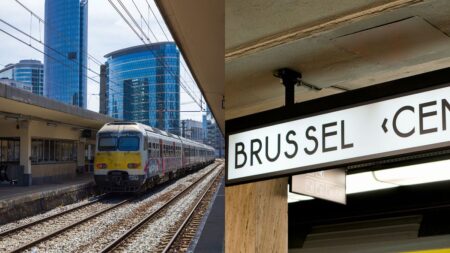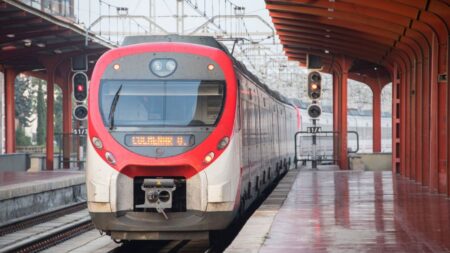Travellers in Belgium are advised to re-think travel plans as the next six weeks hold several planned strikes.
Widespread travel disruption is already hitting Belgium this morning as a 9-day train strike begins.
A nationwide railway strike officially starts today (Friday 21 February) at 10pm, running until 10pm on 2 March.
To add to travellers’ woes, airport workers will continue striking on the 13th of every month until further notice, and travel across Belgium is expected to be impacted by more strikes and mass protests that could last well into springtime.
Read on for Euronews Travel’s advice on how to navigate the travel disruption in Belgium.
Belgium: Nationwide rail strike from 21 February to 2 March
Travellers can expect significant travel disruption in Brussels, Antwerp, Bruges, and other major cities from 10pm on 21 February until 10pm on 2 March, not just with trains but also to other public transport, including buses, trams, and metro services.
In a statement, Belgian National Railway Company SNCB say: “We understand and regret that this strike may interfere with your travels”, adding that “in order to deal with the limited number of trains running, we will put in place an alternative service in accordance with staff availability.”
Most SNCB personnel and those working on rail infrastructure for companies Infrabel and HR-Rail will be on strike, meaning Belgium’s rail network could be brought to a near standstill.
SNCB advises travellers to regularly check for updates via its journey planner on its website or the SNCB app.
International train services, including Eurostar, TGV INOUI, EuroCity, Eurocity Direct, ICE and OUIGO, are expected to remain unaffected, but you can receive live updates on the SNCB International website.
The SNCB suggests you “consider alternative routes when travelling on cross-border local trains to/from Lille, Maubeuge, Luxembourg, Roosendaal, Maastricht or Aachen – and if you need to take a local connection in Belgium before or after your international journey”.
Commuters are already complaining about delays and cancellations
The impact of the rail strikes are already being felt by commuters.
X user @blasco_music wrote on the social media platform morning, “The@SNCB dares to strike for 10 days and put people in even more trouble when you know because of them there are people who already have daily problems with their employers because they never arrived on time.”
Another person, under the handle @KvanCoban, posted even stronger words on X: “What is wrong with the Belgian railways!” and adding, “How can it not be solved for so long? And they say that Belgium is a developed country!”
The nationwide strike comes after recent mass protests in Brussels
Some Belgians are opposed to the new government coalition, and they are taking to the streets to make their feelings heard.
It was estimated that 50,000 people protested on the streets of Brussels yesterday, according to union officials.
These mass protests are to address “imbalances” around public services and purchasing power in the coalition government’s agenda. These include concerns over cutting public services, stricter measures on unemployment benefits, pension reform and workplace flexibility.
Demonstrations of this nature are common in Belgium and are primarily peaceful, especially in the Brussels’ EU quarter (Schuman area) and around transport hubs and government buildings.
However these protests can cause significant problems for public transport, postal services, and air travel, and disruption to businesses.
A general strike has also been called on 31 March. All these strikes are in opposition to the federal government’s proposed policies.
Why are there so many strikes happening in Belgium?
Most of the strikes are targeting new government policies. While negotiations with unions are underway, tensions remain high.
The main reasons for the railway industrial actions are pension reforms, changes to labour law, and budget cuts to rail operator SNCB. The strikes coincide with the school holidays in French-speaking education.
While the government has not responded to the planned strikes, the leader of the Flemish Christian-democratic political party (CD&V), Sammy Mahdi, struck out at the railway strikes, calling them “completely irresponsible.” He called them “a slap in the face of commuters, workers in less privileged sectors and future generations who rely on us to secure pensions,” according to the Belga news agency.
“Organising total chaos on the railways because you’re the only sector that can’t retire at 55? Irresponsible.”
Are rail passengers entitled to compensation during a strike?
The normal conditions for refunding or exchanging your ticket remain the same, even if there is a strike, as according to EU law, train companies have to get ticket holders to their final destination or issue them with a refund.
If you choose to travel even if your train is delayed, you may still be eligible for a partial or full refund. This usually depends on how late your train arrives at its destination.
If your train is delayed by more than 60 minutes, you can choose not to travel and will receive a full refund for your ticket. Alternatively, you can have your ticket reissued for travel at a later date.
SNCB has full details on how to claim a refund here.
Read the full article here

















